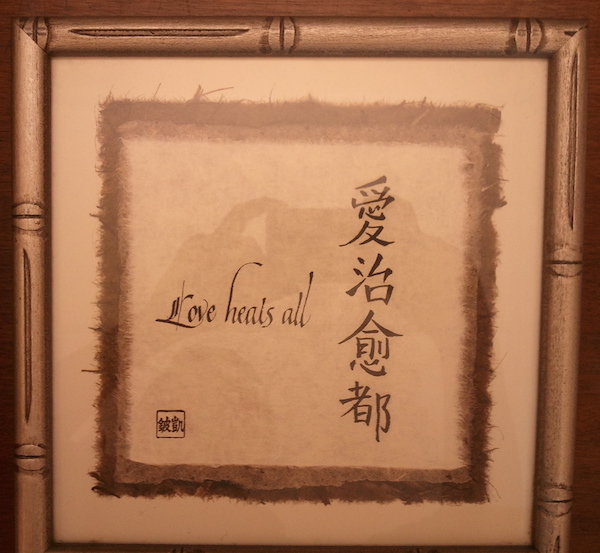Love heals all
« previous post | next post »
Liwei Jiao sent me the following photograph of a framed picture that he bought:
The Chinese is peculiar. It reads:
ài zhìyù dōu 愛治愈都
Individually, the three words do mean "love heal / cure all", but it is neither grammatical nor idiomatic. You need a noun as object after the verb, but dōu 都 ("all") is an adverb and so cannot be used in that position.
I think that a machine could do a better English –> Chinese translation than what's in Liwei's picture.
Google Translate
ài kěyǐ zhìyù yīqiè 愛可以治愈一切
Baidu Fanyi
ài néng zhìyù yīqiè 爱能治愈一切
Bing Translator
zhìyù suǒyǒu de ài 治愈所有的爱 ("heals / cures all love" — an obvious failure to grasp the basic meaning of the English)
Here are some suggestions from human beings who are native speakers of Mandarin:
ài néng zhìyù yīqiè 爱能治愈一切 ("love can heal / cure all / everything")
ài ràng yīqiè fùsū 爱让一切复苏 ("love makes / lets all / everything recover")
ài wú suǒ bùnéng 愛無所不能 ("there's nothing that love cannot do; love is omnipotent")
ài zhìyù yīqiè 爱治愈一切 ("love heals / cures all / everything") (note that this version, suggested by several correspondents, omits the potential auxiliary, which is not in the English original, but which several correspondents, as well as Google Translate and Baidu Fanyi, felt obliged to add)
[Thanks to Rebecca Fu, Jing Wen, Fangyi Cheng, and Lei Yang]

Thomas Lumley said,
May 10, 2016 @ 5:04 am
Looking at Chinese translations of 1 Corinthians 13:7 would probably be useful, too — it sounds like an allusion. The King James English translation is [Love] Beareth all things, believeth all things, hopeth all things, endureth all things.
There are Chinese translations here
Victor Mair said,
May 10, 2016 @ 8:45 am
@Thomas Lumley
Thanks for the very interesting suggestion.
Since ài 愛 ("love") is not explicitly mentioned in the cited parallel verses, although it is clearly the implied subject in the passage as a whole, and since "heal" is not one of the verbs used in the cited parallel verses, what we can take away from the suggested comparison with the Chinese translations of 1 Corinthians 13:7 are two things:
1. Whereas there is near unanimity among my correspondents in rendering the "all" of "Love heals all" as yīqiè 一切, the passage from 1 Corinthians 13:7 repeatedly refers to fánshì 凡事 ("all things").
2. If we redid our translation of "Love heals all" on the model of the Chinese renderings of 1 Corinthians 13:7, it would come out (with "love" the implied, but not explicitly stated, subject) as: fánshì zhìyù 凡事治愈 ("healeth all things"). Although the inversion of verb and object in fánshì zhìyù 凡事治愈 ("healeth all things") gives a more King Jamesy effect, I do not think that is as satisfying as [ài] zhìyù yīqiè [爱]治愈一切 ("[love] heals / cures all / everything") for two reasons:
a. yīqiè 一切 ("all / everything") is more comprehensive than fánshì 凡事 ("all things")
b. the reified connotation of fánshì 凡事 ("all things") doesn't fit so well with "heal" as it does with the series of verbs in 1 Corinthians 13:7 — "bear", "believe", "hope", "endure".
Still, I enjoyed engaging with your suggestion and agree that the saying in the picture above was probably inspired by or alludes to 1 Corinthians 13:7.
Coby Lubliner said,
May 10, 2016 @ 9:59 am
Are the Chinese translations from English or from NT Greek?
Thomas Lumley said,
May 11, 2016 @ 1:59 am
@Cody Lubliner the CUV is based on the English Revised Version, a 19th century update of the King James. Don't know about the more modern Chinese translation.
Kevin McCready said,
May 21, 2016 @ 1:48 am
Speaking of bible translations, God's Secretaries: The Making of the King James Bible by Adam Nicolson, is a MUST read.